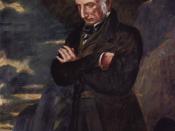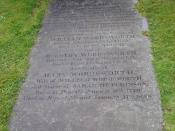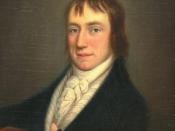William Wordsworth View of How "The World is Too Much With Us"
During the late eighteenth century, the Industrial Revolution was born. The Industrial Revolution was the beginning of an industrialized economy in which machines were developed to facilitate the mass production of clothes and other textiles; the Industrial Revolution changed the world. Even though, the birth of the Industrial Revolution changes the world, however, a poet, William Wordsworth objects to this new change. He expresses his objection in the poem, "The World is Too Much With Us." In this poem, Wordsworth describes his inner passions towards nature and his criticism towards the materialistic world. In his poem, Wordsworth describes his perception of the world, his perception of how the world ought to be, and his perception of the future.
In his poem, "The World is Too Much With Us," Wordsworth vocalizes his perception of the world in his time.
During his time, Wordsworth sees that the people of the world have an obsession with "getting and spending" (2.766). "Getting and spending," he expresses that the people of the world carelessly exploit the earth without any thoughts and he believes the world is becoming greedy and lazy. Wordsworth believes that because of human's obsession of "getting and spending", "we lay waste our powers" as a result of our incompetence of upholding the bond between humans and nature (2.766). Wordsworth believes because of human's hunger for "getting and spending," the connection with nature the human's spirituality is lost. Wordsworth believes that "We have given our hearts away," which is an indication that humans are ignoring their natural emotions, thus causing the "out of tune" with nature (8.766).
Wordsworth, also, describes his perception of how the world ought to be. He writes, "Little we see in nature that is ours,"...


